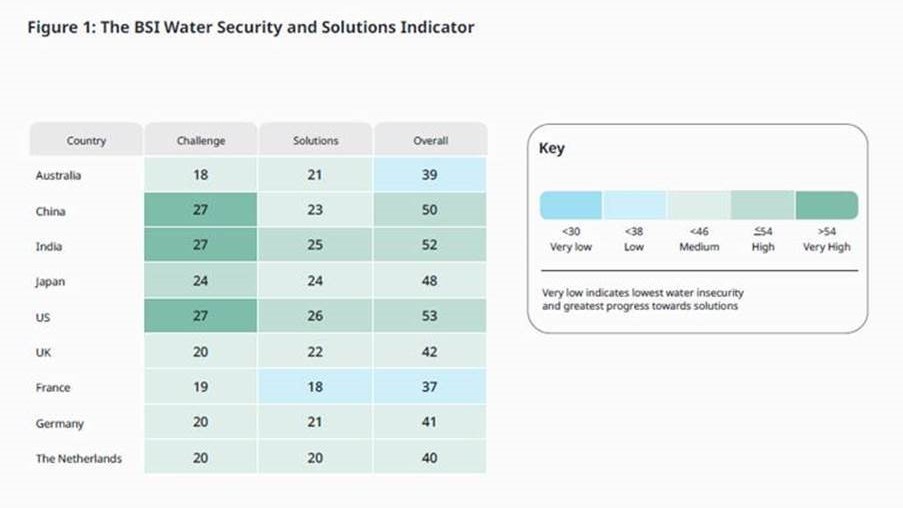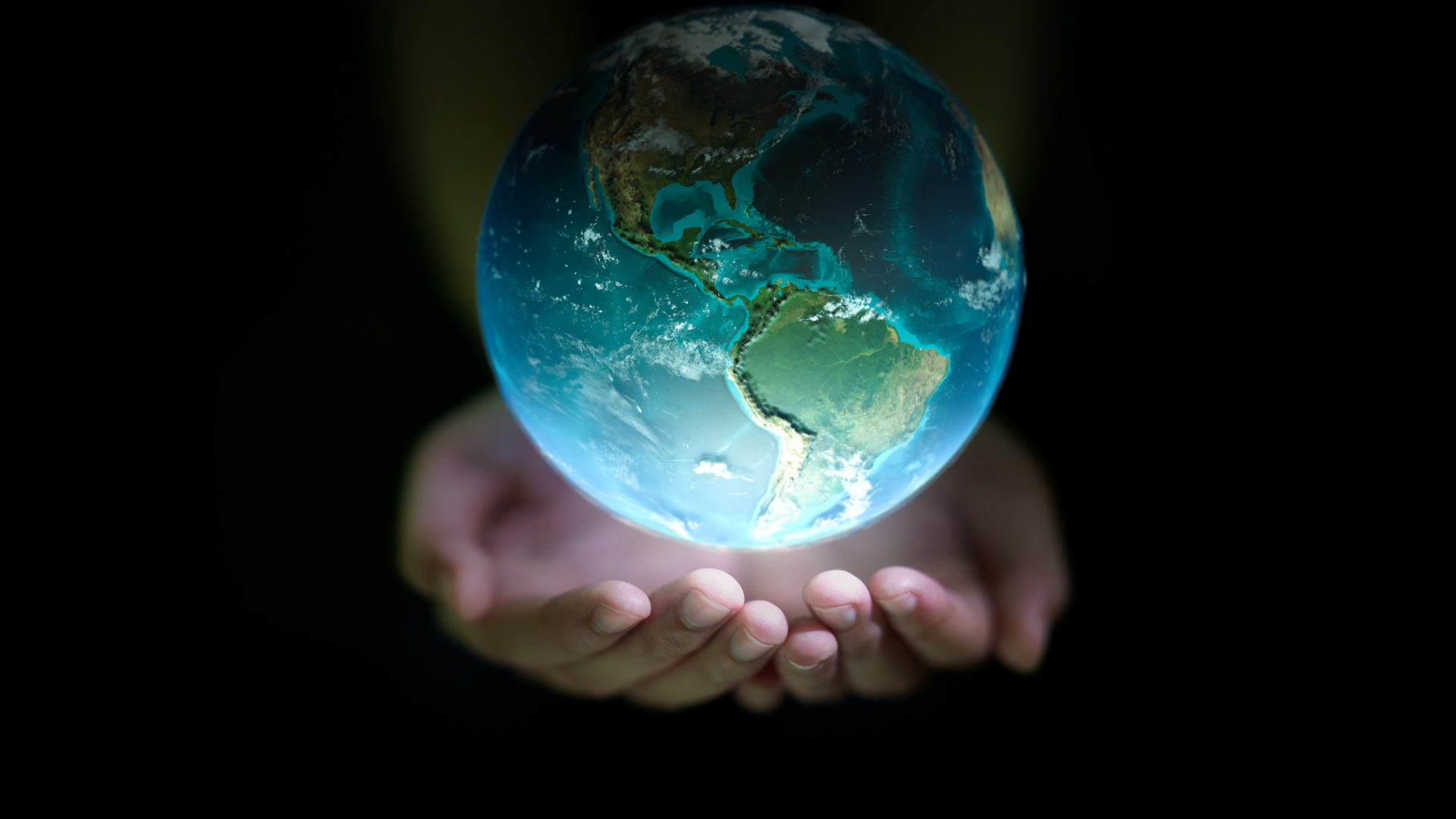China, India and the US have been rated as facing the highest level of water security challenges alongside relatively limited progress towards solutions in new analysis published by BSI and Waterwise, while there was no improvement in the water security of 31 countries in the last 12 months.
The study combines publicly available data with international polling of over 9,300 people to evaluate how water insecurity is perceived in some of these countries, finding a concerning disconnect between the reality of the challenge, public understanding of its severity, and the action required to turn things around.
Although 60% of respondents recognize water security as an important global issue, and three quarters specifically cite drought in their country as an issue (76%), under half (45%) said addressing water security was as important as addressing climate change. The polling also found that only 15% globally say they see water security discussed regularly by politicians or media, despite the fact that annual water use rose by around 3,500 billion m3 globally between 1900 and 2024 and will worsen with climate change. Put in context, this equates to adding 895m3 of water demand each second.
Global water demand is projected to grow by around 1%, or 400 billion m3, per annum. On this basis, new calculations show that the world could add 1268 m3 of water demand per second.

In the 2024 Water Security and Solutions Indicator, China, India and the US all score above 50 out of a possible 85, meaning they face some of the greatest challenges and are making limited progress on solutions. Compared with this, the polling data suggests gaps between the reality of the global water security challenge and public comprehension of the scale of the issue – 74% claimed to be confident in their country’s freshwater supply, but this included 85% in India, 82% in Australia, and 73% in the US.
The greatest increase in a water security challenge score was seen in Spain, which went up by five points, due to an increasing proportion of the country’s available freshwater being abstracted, a decrease in the price of water relative to national GDP and a decrease in water use efficiency. This increase is particularly concerning in light of the water scarcity challenges faced by Spain in the last few years, such as the drought emergency declared by the Catalonia regional government in February 2024. Of the 41 assessed, 13 received higher scores representing greater water insecurity in 2024 – these included Türkiye, North Macedonia, the Netherlands, and Belgium. In Asia, China, India, and Japan also received worse scores.
Decreases since 2023, indicating improvements in water security, were generally small and only seen in nine countries, including Sweden, Switzerland, Slovenia and Norway.
Positively, more than half of people (53%) believe in the need to act, saying it is important for individuals to take steps to reduce wastage and promote water security. 73% globally would support the introduction of water use labels on products, reflecting a strong desire for actionable solutions. Similarly, more than two thirds would be willing to spend more on brands acting on water efficiency (68%) and two thirds (67%) would purchase items using less water intensive materials (e.g. recycled cotton) even at greater cost.
Ghinwa Chammas, Group Director of Sustainability, BSI, said:
“The UK’s slow progress on addressing water insecurity risks constraining the country’s growth, as freshwater is a finite resource and the research shows that much of our water infrastructure is not currently fit for the future. Just as with the climate crisis, we need to invest in future-ready infrastructure and educate consumers to make sensible choices where they can. The cost of investing in water security now and increasing awareness of the issue will be nothing compared with the potential cost to households and businesses of not having enough water available for use in the future.”
Susan Taylor Martin, Chief Executive, BSI said:
“While we are seeing pockets of progress towards a water secure world, there is more to do to promote understanding and positive change. This begins with awareness and recognition of the scale of the challenge, and how it fits into broader conversations about climate change and sustainability, from there our politicians and leaders can pave the way for action.
“While there is no single solution, we can and should take action today—from implementing water efficiency labelling to improving consumer choices, to advancing wastewater management in pharmaceutical development. There is much we, as individuals, organizations, and society, can achieve collectively. At BSI, we believe that individuals and organizations can come together to drive progress toward a sustainable future, where the supply of fresh water meets growing demands.”
Nicci Russell, CEO, Waterwise said:
“Whilst there is a genuine appetite in the public to be part of the solution, the water security challenges our world faces remain with us. Progress is frustratingly slow in most of the world and in other parts, the challenges posed by water security are actually growing. What is crystal clear from the research is that a key part of the solution is making sure that we use the water that we do have wisely in our homes and workplaces. In doing so, we will ensure that we adapt to climate change better, secure water supplies for people and businesses, and enhance the environment.”
Globally, Britons (21%) and the Japanese (15%) were least confident in their understanding of their country’s level of water security, potentially indicating the impact of insufficient political and media focus. Additionally, a quarter globally lacked confidence in their country’s infrastructure for ensuring water security, with the lowest confidence levels reported in the UK (32%) and Japan (44%).
BSI sets out tangible areas for action in the report, including calling on media and policymakers, along with businesses and other organizations, to shape the conversation and raise awareness by incorporating water security into climate discussions. Additionally, BSI is urging consumers to be supported to make informed, sustainable choices, for example via tools like mandatory water efficiency labels, used in Australia and Singapore, to boost consumer awareness and market innovation in water conservation.
The research also reveals:
- 76% of people believe medicines should be a national security priority, so governments should prioritize water supply for the pharmaceutical sector.
- 82% say pharmaceutical companies should strictly control wastewater and face fines for breaches, even if it raises medicine costs.
- 62% of consumers now look for sustainability claims when buying products, with 68% willing to pay more for food and beverages from brands that demonstrate good water efficiency. This willingness rises to 75% if there’s no extra cost involved.
- There is strong interest in water labelling, with 73% wanting to know the water used in products to make sustainable choices.
- 60% see flooding in their country as an issue while three quarters globally see drought in their country to be an issue, indicating drought is perceived to be a higher risk.



